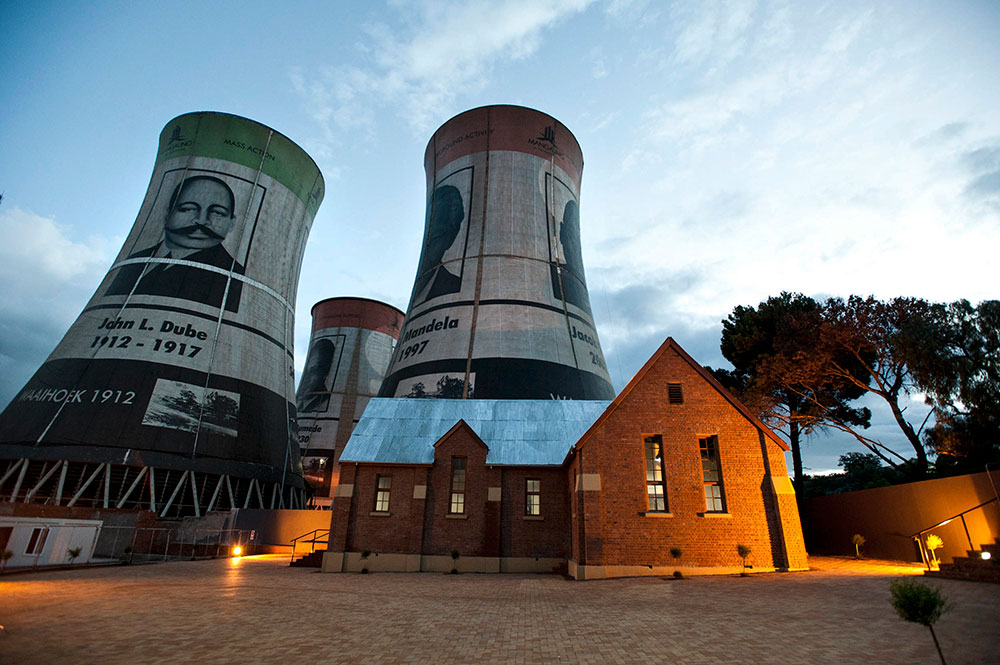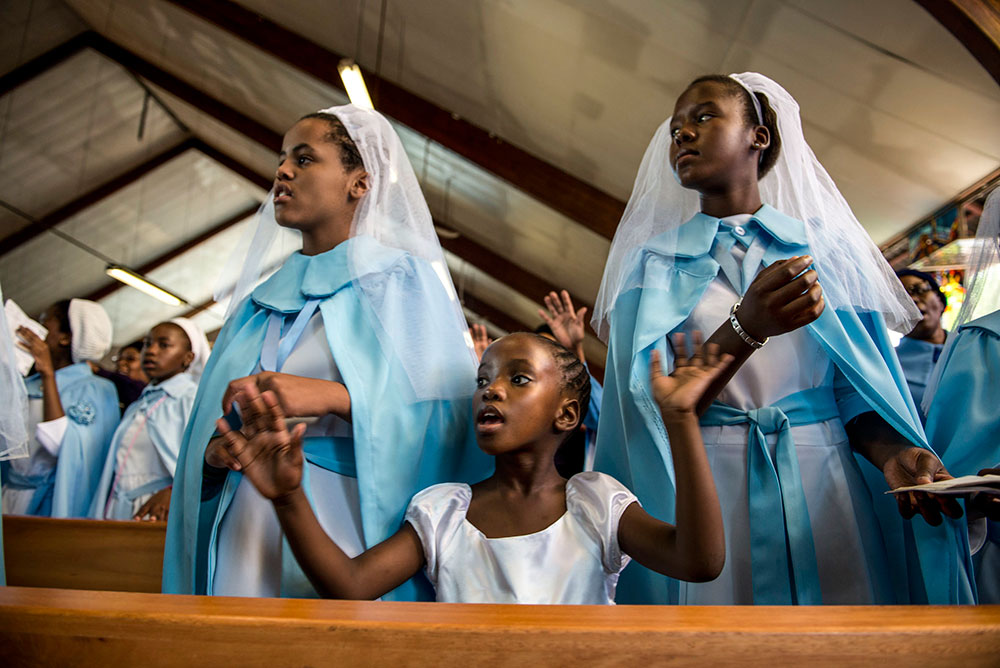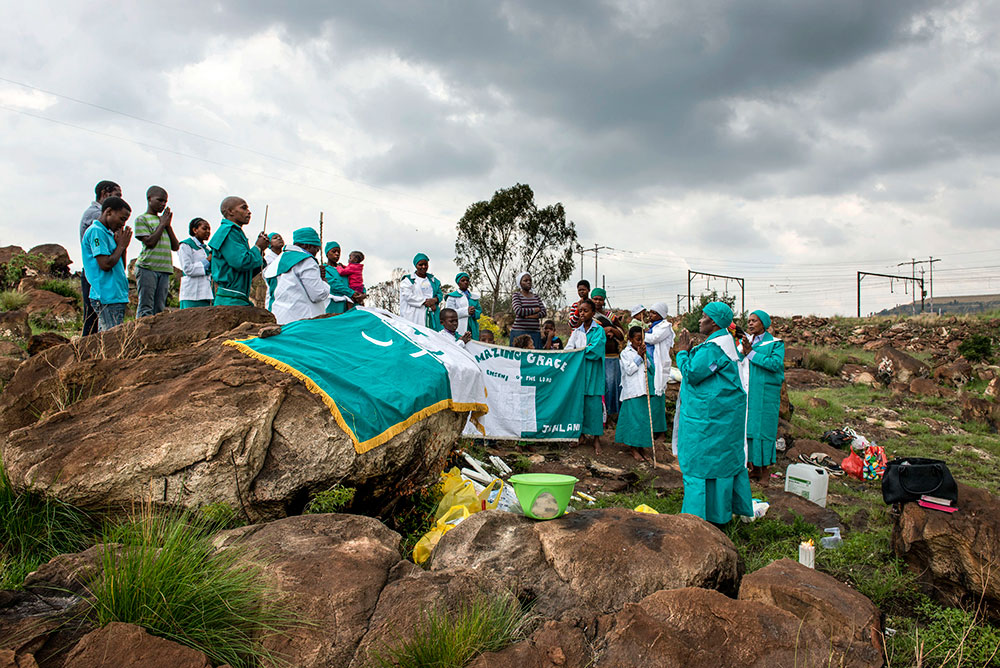Jacob Zuma is blessed by local pastors and priests during a campaign event at the Interfellowship Church in Durban.
Religion still does not have a grown-up seat at the political table, and has no real prospect of getting one. Yet the political parties continue to keep a wary eye out.
The leader of the ruling party is an honorary pastor with self-confessed deeply held religious beliefs. But every time religious leaders of the less enlightened variety try to reopen debate on issues such as abortion or same-sex marriage, they have to disguise their intent to secure even low-level meetings. The ANC would never consider rolling back individual freedoms – not even those that get it branded heretical and ungodly, and Jacob Zuma, in extreme cases on the far right of the religious spectrum, as the anti-Christ.

The restored Waaihoek Church at the birthplace of the ANC in Bloemfontein. (Madelene Cronje, M&G)
The leader of the official opposition was a campus pastor of a conservative church and considers himself called to politics by way of faith. But despite the fears of old-school liberals when Mmusi Maimane took the reins of their party last year, the Democratic Alliance of Maimane maintains a utilitarian view of religion; for the DA churches are potential partners that can help fight alcohol abuse, and that can help reintegrate criminals back into society.
The leader of South Africa’s third-largest party, Julius Malema, once made a pilgrimage to charismatic pastor TB Joshua’s Synagogue Church of All Nations in Lagos, and funded the building of a church in his home town. But the Economic Freedom Fighters (EFF) has a prescriptive approach towards religion, having promised to compel churches to provide training on gender issues.
“I have never hidden the fact that I am a believer in Christ,” Mangosuthu Buthelezi, leader of the Inkatha Freedom Party (IFP), the fourth biggest party in the country, told a congregation in a speech in January.
The National Freedom Party’s Zanele kaMagwaza-Msibi wrote this in an open letter to her supporters about a long illness in November: “Yes, I had a close shave with death, but God performed miracles, so much that I am now able to write this letter to you.” She leads the fifth-biggest political party in the country.
In South Africa, to find politics that is anything other than blatantly secular and humanist you have to delve even farther down the rankings to the African Christian Democratic Party – which secured not quite 0.6% of the national vote in the last general election – then on to the Muslim party Al Jama-ah, which could not win a seat in Parliament.
In a country that is vastly religious and overwhelmingly Christian, parties remain wary of the potential political energy that remains dammed up in churches, treading carefully when the state threatens to drag religion into the political realm by force. But otherwise they pay little heed to the supposed guardians of morality.
Towards the end of last year the Commission for the Promotion and Protection of the Rights of Cultural, Religious and Linguistic Communities shook itself out of a long slumber and started to investigate persistent reports of exploitation under the guise of religion: congregations promised miracles and made to take part in activities not usually recommended, such as drinking petrol and eating grass.

Enthusiastic youngsters at the Regina Mundi Church in Soweto. (Paul Botes, M&G)
The commission was previously almost unknown, even among the religious community part of its mandate covers. But when it used its legal powers to issue summons to pastors to appear at hearings – and when some of those pastors kicked up a fuss – it did not take a lecture on the Constitutional Chapter 9 institutions other than the well-known public protector to make the point. It was clear that the commission spoke with the coercive power of the state, as the ANC too noticed.
“As a liberation movement and the governing party of South Africa, the ANC has consistently affirmed the importance of religion in public life,” wrote businessperson and one-time ANC chaplain Vukile Mehana in the party’s internal newsletter in November, in a piece that deftly walked a narrow line, to each side of which yawned chasms of danger.
The ANC, Mehana admitted, could not “afford to be seen” to be involved in an adversarial relationship between a state organ and churches, which could “lead to the perception that the ANC-led government is trying to usher in state regulation of churches by stealth”.
But defending what he called the “excesses by certain faith-based organisations” would not do either, so instead Mehana sharply criticised the commission for choosing confrontation. In effect an important constitutional organ, with commissioners appointed directly by Zuma, came in for a spanking. Two months later Zuma used an important ANC statement to express national pride in chapter 9 institutions such as the commission.
“These institutions have important roles to play in building this nation and the ANC remains committed to supporting them as they carry out their lawful duties,” Zuma said in his party’s annual January 8 statement.
Other parties took part in the same dance, albeit less skilfully. National leaders insulated themselves from the issue, leaving detailed discussion to lower-level functionaries while they spoke in broad terms of the importance of the Constitution and religion.
No party took a militant line, not even the EFF, which was intimately involved in the destruction of a tent used by the man dubbed “the snake pastor” for encouraging his followers to eat the reptiles. Its branch had led the community in their protest against the pastor, the EFF said, but the actual destruction had been carried out by young people who had gone rogue.
The political opportunity was glaring. South African parties are not known for their caution, happily toying with matters as explosive as race and xenophobia. Church leaders with enormous sway over their followers were all but begging for political players to make alliance, yet were met with indifference.
On the surface it was a puzzling contradiction. But to the theologians who have long been watching the evolution of South African religious thought it made perfect sense. Political parties, they say, whether consciously or instinctively, recognised the truth: despite their influence churches have no ambition to be politically active, little power to convince their congregants to vote as a block, not a great deal to offer the country philosophically, and are actively making themselves less relevant with every passing day.
“There is just no conception within the sort of vision of church theology we have of what it would mean to mobilise around religion again, how you would even imagine entering the economic or political realm,” says Gerald West, a professor at the University of KwaZulu-Natal’s school of religion, philosophy and classics. “The kind of theology we have today has no vision for the New Jerusalem. It doesn’t know what to do with political power, except to court it, except to be close to it. It doesn’t know how to engage with it.”
In 1985, as the State of Emergency failed to keep the lid on violence in South Africa, a group of scholars issued the seminal Kairos Document to provide a philosophical framework for the struggle against apartheid. It defined the public face of Christianity as “church theology”, which mouthed fixed tenets of faith but failed to apply them to a reality of oppression, keeping faith separate from politics.
This was better than “state theology”, the authors argued, which sought to justify the status quo and its racism with scripture, but what was required was “prophetic theology”, which could use the Bible to chart a course out of oppression and towards social justice.
“The problem today is that church and state have both settled for church theology in a highly individualised form, where there is no engagement with the more systemic dimensions of life, and the prophetic is almost entirely absent,” says West. “The churches have retreated into what you can call maintenance mode: you can almost hear them saying ‘we focused outwards during apartheid; now we have to give attention to the structures of the church and its people’.”

Open-air worship at the Amazing Grace Zionist Church in New Canada, Soweto. (Madelene Cronjé, M&G)
Churches have not gone down that path alone. As early as 2011 the ecumenical Kairos group, named for the 1985 document, warned the ANC that it was showing a distinct inclination towards rewarding those churches that uncritically support the party during elections, but are otherwise absent from politics. Such co-opting of religion, the prominent clerics warned, serves neither party nor people.
If anything, though, that warning heralded a hardening of positions. Traditional churches, most notably the Methodist and Catholic churches, became increasingly and more formally critical of hot-button issues such as corruption. An opposite but equal response from more charismatic churches criticised their peers for playing at politics, and expressed support for the ANC and its leaders.
The split between churches was clear, and telling, at a time when the struggle between traditional religions and what they characterised as “wealth churches” grew ever fiercer. That battle seemed to distract those who believed they should be on the political stage.
“The mainline churches that were at least to some extent engaged in the anti-apartheid struggle were no longer looking over their left shoulder but at their right, at these what I would call neo-charismatic and neo-pentecostal churches,” says West.
It was, with some refinements, the situation that had been predicted for many years. “No one seems to be crafting a theology of transformation to guide us and bring us together, as was the case with the theology of liberation in the apartheid years,” said then Western Cape ANC leader Ebrahim Rasool in a 2002 paper decrying the idea “that the church has only one role politically, and that is to be the watchdogs of society”.
If history is any guide that will change, as the religious balance of power always does. Yet there is no real prospect for change that will result in religion in South Africa becoming a political force beyond pliant palace prophets on the inside and ineffectually barking watchdogs on the outside.
The future promises a church with intellectual challenges that will, if anything, see it sink deeper into the theological morass that has made it such a nonplayer politically – until, perhaps, things reach breaking point.
Where churches used to be platforms for change, attracting the best and brightest, they are now “really struggling to attract young people who can operate at a degree level of theological education”, West says. Even as churches proliferate and fracture, and the appetite for preachers grows, the number of students enrolling in anything beyond certificate- and diploma-level studies of religion are dwindling.
“We face a very real prospect in the near future that the average level of education of the congregation will be higher than the average level of education of the clergy,” says West. “That will lead to some interesting contradictions.”
The result may just be ever more superficial religion, promising worldly wealth and victory while ignoring crime and poverty and sin. On the other hand, it may result in self-organising religious communities emerging, or even political structures stepping in to provide leadership. Because ultimately any morally responsible theology must take into account such diverse factors as the conditions under which other people live and the state of the natural environment – things in turn determined by politics. And a morally responsible theology is its own imperative.
Phillip de Wet is associate editor of the Mail & Guardian.
Church faces its kairos
Christian theologians have made several stabs at guiding politics by way of their religion, in a series of pronouncements that came to be known collectively as the Kairos Documents, named for a Greek concept of a period of time during which critical events take place.
The first Kairos Document, in 1985, was squarely focused on apartheid, but in the following years many other political issues were tackled, at home and abroad, to various levels of theological controversy.
1985: Challenge to the church
“The challenge to renewal and action that we have set out here is addressed to the church. But that does not mean that it is intended only for church leaders. The challenge of the faith and of our present Kairos is addressed to all who bear the name Christian. None of us can simply sit back and wait to be told what to do by our church leaders or by anyone else. We must all accept responsibility for acting and living out our Christian faith in these circumstances. We pray that God will help all of us to translate the challenge of our times into action.”
1989: Kairos and conversion
“The particular crisis or kairos that has led us to the writing and signing of this proclamation of faith is the conflict between Christians in the world today. We have wished to make it quite clear that we believe that those Christians who side with the imperialists, the oppressors and the exploiters of people are siding with the idolaters who worship money, power, privilege and pleasure. To misuse Christianity to defend oppression is heretical. And to persecute Christians who are oppressed or who side with the oppressed is apostasy – the abandonment of the gospel of Jesus Christ.”
1990: Violence: The new kairos
“On the one hand we have talks about talks and the hope of negotiations in the near future; while on the other hand there is more violent conflict than ever before. Exiles are about to return, prisoners are being released, and yet there are others who are still being detained. While we are experiencing a new balance of forces with talk about an interim government and the need to restructure the economy, we are also experiencing mysterious forces that are killing our people …
“A strong, clear prophetic word is needed. The sins of the wicked must be exposed and condemned. We dare not sit back and wait because the evidence is not yet technically complete, while hundreds of people are being slaughtered on our streets. We must speak up, we must raise questions, we must take risks, we must call for inquiries … The primary task of the church at this moment, then, is not to call for peace but to call for justice. The culprit must be found and brought to justice. And there must be no cover-ups. Because unless justice is done and seen to be done, there is no hope of peace in the near future.” – Phillip De Wet